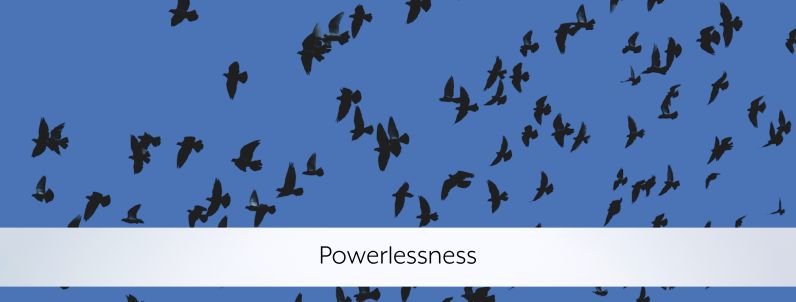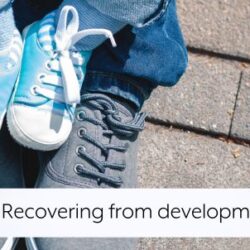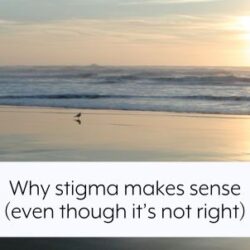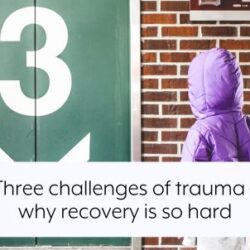
Sometimes my head feels as if it has a flock of birds in it, swooping chattering starlings, full of noisy nothingness, just busy, active, dazzling activity. Then I can see a field, a 5-
bar gate, a barren field laid fallow and a concrete- grey sky that is leaning on the earth, too heavy to prop itself up. There’s nobody, just nobody, nobody to run to, nobody to turn to. What do I need to do to find somebody who will listen? I’m in a strait- jacket of silence, mustn’t tell, mustn’t say, mustn’t complain. I can’t explain what that feels like – the stringency of silence, powerlessness of a child. Things won’t ever change, this is how it is, didn’t you know? That bird in the rafters of the barn – it doesn’t even want to fly free. It’s hiding in the safety of the corrugated roof where rust binds to rust and everything is decayed and uncared- for.
I wrote this in about 2007. I was trying to express some very intense feelings of powerlessness that I had at the time. There was a particular trauma memory that I was working with, the backdrop to which involved a field, a 5-
David Finkelhor, a well-
- traumatic sexualisation
- stigmatisation
- betrayal
- and powerlessness.
He saw that the dynamics of powerlessness are played out in a number of ways. Firstly, the child’s body is invaded or violated against his or her wishes, and that vulnerability to invasion continues over time and in other contexts. That is one of the factors that makes victims of abuse more likely to be re-
I hadn’t realised that someone in another country, writing even at the time of some my abuse, someone that I didn’t know and have never met, could so accurately describe my experience. Back in 2007 I also didn’t realise that my experience is eerily similar to that of millions of others. I thought that what happened to me happened because I was bad. And the feelings of powerlessness my abuse had left me with I attributed to my own weakness, and further proof of my inherent culpability. Like soldiers from World War 1 suffering ‘shell shock’, what we now know to be post traumatic stress disorder (PTSD), I blamed myself for moral weakness because I was rendered helpless and powerless by the overpowering of people bigger and stronger than me.
One of the things that helped me break out of the guilt cycle of having been impacted by abuse was seeing those same effects in other people, people for whom I had compassion and whose abuse I could view through an unbiased lens. As the outside observer, it seems inconceivable to me why my friend Liddy would feel responsible for having been abused when she was a 4-
The entry from my journal in 2007 reflected my experience of powerlessness as a child and correlated strongly with the things that Finkelhor was saying. There really was this forlorn internal sense of there being nobody that I could turn to and so nothing I could do to stop the abuse. I really was powerless. I identified with a bird caught up in the rafters of a barn that seemed to have given up wanting to get free. What I saw in myself was that same sense of ‘learned helplessness’, where you’ve tried and failed so many times that you simply stop trying. To continue to try feels like madness, a waste of energy and already scant resources.
My dreams – and many times my nightmares – reflected this sense of powerlessness within me. When I could sleep, which was cruelly seldom, endlessly I would dream of situations where there was no escape: I couldn’t run fast enough, I couldn’t get out of the way in time, I was trapped. I would then wake with a sense of depleted energy and exhaustion, a lassitude, a kind of “What’s the point?” that is so often the hallmark of depression.
Powerlessness is such a core experience for victims of abuse that often we don’t even notice that it’s there. It is played out in the way that we interact with people and the world – it’s the shadow cast by the sun, rather than the sunlight itself. For me personally I began to see the shadow of powerlessness in various forms in my life: being competitive, craving knowledge, being overly submissive to ‘authority figures’, competing with men, and rejecting femininity.
Being competitive
I was competitive not just in sport (which I loved, and at which I excelled) but in everything I did. I would do everything I could not to lose, whether it was a game of badminton or a game of Monopoly. I wanted to be the best I could be, or nothing at all. All the time I was trying to prove, “I can … I can … And I won’t fail.” Feelings of inadequacy, of losing or failure, would elicit in me very strong trauma reactions – not just disappointment that I had lost a game of badminton with a good-
Knowledge
Somewhere along the line I made a leap in my head that if only I knew more, I would be safe and I wouldn’t be powerless. So I became a knowledge junkie. I had to know everything I could – regarding scraps of information as if they were lines of cocaine – and with a kind of desperation that believed that if I didn’t know a certain fact, something bad would happen. Of course this was magical thinking, because I wasn’t abused because I was stupid, or didn’t know something – I was abused because people who were bigger and stronger than me decided to abuse me. But a healthy curiosity and interest in learning became an obsessive need to know, as if that would somehow ward off future abuses. I couldn’t enjoy my academic successes, because there was always more to know.
Being overly submissive to ‘authority figures’
I guess I spent a lot of time figuring out who really had the power, and my ploy in the face of really powerful people was to submit, almost to the point of obsequiousness. Normally fairly confident and used to holding my own, I would crumple in the face of an ‘authority figure’. This could be a real authority figure, or a perceived one – someone who just reminded me of those figures from my childhood. And when that happened, I couldn’t speak up for myself; I just had to do what they said; and I fell back into an automatic mode of submission, of learned helplessness. Mostly they were treating me as an adult, expecting me to say ‘No’ if I disagreed with something that they were saying or proposing, but I couldn’t. I had to do exactly what they said, whatever that was. And because of this, without meaning to, that person then adopted the role of perpetrator again in my life – because they were enacting an abuse scenario where they were ‘making’ me do something that I didn’t want to. It’s no surprise that I would struggle in my relationship with them.
Competition with men
My father had brought me up more as a boy than as a girl, so I had learned skills that are more stereotypically the domain of the masculine, things such as building and DIY and cars and driving. And then I used those skills, some of them highly refined, to outperform the men around me in my adult life. During my twenties, the peer guys I socialised with used to have a hard time of it with me, especially when we were doing something like DIY or moving house. I was out to prove that they weren’t stronger than me, or better than me. It wasn’t the smartest way either to make friends and influence people, or to find a suitable chap to marry, because I was almost obsessively competing with men all the time. It was an unconscious thing, something that I put down to my ‘personality’, but rather than leading to a sense of self-
Rejection of femininity
I grew up despising any form of ‘femininity’ that I perceived as being weak or pathetic, especially anything that smacked of my mother. So I didn’t do crying, or ‘being pathetic’, or ‘silly girly stuff’ or anything that would allow me to come across as weak or vulnerable, or the object of anyone else’s sexuality. In effect I was acting as if everyone was going to abuse me, given the chance, whereas in reality they weren’t – apart from a few. I was abused again as an adult, but I had been looking out for the wrong danger signals – I saw safe people as dangerous, and dangerous people as safe, and had no way of distinguishing between the two. My fear of powerlessness had loaded the wrong schematic onto my screen and left me, ironically, wide open to revictimisation.
Admitting powerlessness
Admitting powerlessness is a strangely difficult thing to do. Admitting it in therapy sometimes feels even harder – being vulnerable is scary at the best of times, but being vulnerable in an intimate relationship, because that is where at least a significant proportion of our abuse was perpetrated, sends off a warning siren that drowns out our reasoned common sense that says that this person, this authority figure who holds a certain amount of power in our relationship, is safe. Looking back at and accepting our powerlessness as children is far harder than people mostly accept – it is as if everything in us screams out, “No, I wasn’t that powerless! It can’t be!” A lot of the time it’s easier to blame ourselves for what happened, to rewrite history so that we chose to be abused, rather than face that terrifying internal vision of our utter helplessness. Because, the logic goes, if we chose to be abused, then we can choosenot to be abused again. Powerlessness, on the other hand, says that we can guarantee nothing in life – it is out of our control. And having had so little control in reality as children, lack of control often terrifies us now as adults. And we do almost anything to cling to the fairytale that we have control over what happens in our lives – images of tsunamis in Japan or famines in Somalia or terrorism in Norway are sometimes too unbearable for us to watch, because it confronts us again with the powerlessness everyone has in the face of either forces greater than us, such as Nature, or determined human evil.
In terms of dissociative identity disorder, the impact of powerlessness played out in various ways for me and was the subtext for a number of the splits between various groups of alters internally. There were the ‘weak ones’ (the ‘little ones’) and the ‘strong ones’ (the ‘big ones’), with the former group of child-
Having suffered a breakdown in 2005 and eventually having given up work through sheer inability to function in 2007, this damp, musty cloth of powerlessness again suffocated me. Pierre Janet, as expounded through Pat Ogden’s sensorimotor approach to psychotherapy, talks about ‘acts of triumph’ and how trauma survivors such as myself have not been able to perform any of the actions characteristics of the stage of triumph. This was replaying again for me in this state of ‘breakdown’ in 2007 – no job, no self-
The battle with powerlessness through that time was huge. It was a bit like battling The Ring in Lord of the Rings – this thing that sung to me, wooed me, soothed me, threatened me and would eventually destroy me. Like Frodo resisting the urge in the presence of the Ringwraiths to put the ring on his finger, to descend into that murky half-
I have found that it is one thing to name powerlessness as a factor in my life; another to allow myself to feel it; and another to stand up against it and insist on moving towards recovery. The danger of getting in touch with powerlessness is that we fail to make a distinction between the powerlessness we experienced then and the powerlessness we do not have to endure now. And as with flashbacks, memories and feelings, the most helpful thing we can do in our lives as dissociative survivors is to learn to distinguish and differentiate between then and now. Because if we allow powerlessness to triumph, then we will remain a victim for the rest of our lives.



6 Comments
Thanks Carolyn for simplifying the issue of powerlessness in this context, and clarifying its underlying significance within the bigger picture. I really appreciate how you have explained it.
Very helpful article, it explains why all survivors I know, including myself, have struggled or are still struggling with the need to be in control.
So insightful and enlightening to me and for my work with survivors. The whole ‘powerlessness’ and grip on ‘control’ epitomises the characteristics I see in survivors and therefore allows me to empathise, unconditonally accept and reflect back congruently. Thus removing the red velevet throw from their reflection in therapy and allowing them to see another perspective other than the one they’ve clung too for so many years. I cannot tell you how helpful and important Carolyn’s eplanations are.
Such incredible honesty, humility and vulnerability in your words Carolyn. I am just in awe of you and your story. There is just so much to learn from you, I have been incredibly moved throughout this course. Keep up your amazing work! Many blessings today and forever
I’ve been struggling really badly because of my ptsd due to childhood trauma. The only consolation I have is learning and understanding it as much as I can.
I’m so thankful to have found this blog.
Waw. Reading your blog posts and books have enabled me to fully understand aspects of myself that I had not yet been able to put into words. This understanding – has been pivotal to developing self compassion, and, thus, greater self-worth.
I am greatful for your vulnerability and strength.
I am currently on my own journey to understand my fear of losing control and how this has been impacted by trauma.
Kind Regards,
x